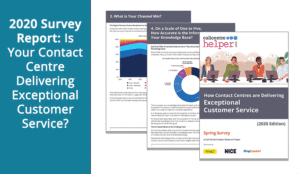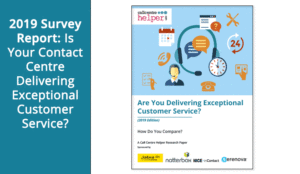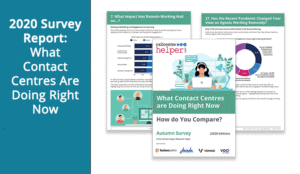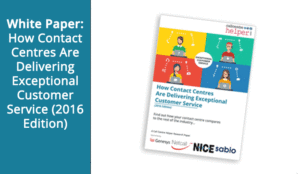Throughout March 2020, in partnership with Jabra, NICE and RingCentral, Call Centre Helper readers were invited to take part in the first of our two industry-wide annual surveys.
We asked 18 questions of 213 industry professionals, to find out how contact centres are delivering great customer service to the modern customer.
The report covers a number of different industry-related topics, including chapters on customer experience, contact centre metrics and headsets.
We also explore many more areas, including channel mix, changing contact volumes and knowledge management, to get more in-depth insight into the industry today. We hope this will help you to benchmark your contact centre against others.
This report also contains comparisons with some of our findings in our previous reports, so that we can spot some of the key trends that are developing throughout the industry. We are delighted to share the results with you.
[The data that is included in this report was collected before the COVID-19 crisis took hold in many contact centre operations across Europe and the US]
Continue reading this article to discover some of the headline findings and the responses to the final question, or if you are interested in a specific chapter check out one of these extracts:
Alternatively you can download the full Call Centre Helper survey report ‘Is Your Contact Centre Delivering Exceptional Customer Service?‘ now.
Executive Summary
People, Process and Technology. These are the three core elements of great contact centre performance.
Our comprehensive report gives unique insights across each of these areas, to show how contact centres are delivering exceptional customer service.
With this in mind, let’s take a quick look at some of our most interesting findings.
Contact Volumes are Increasing
While many contact centres have seen overwhelming contact volumes due to the coronavirus outbreak, contact volumes had been steadily increasing even before the crisis.
In fact, 54.7% of contact centres surveyed told us this, almost double those that said contact volumes were decreasing. The remaining participants told us that volumes remained “much the same”.
One reason will likely be the rise of digital, with contact centres offering more channels for customers to contact them.
When you offer these communications preferences, customers are more likely to contact you about things that they might have previously overlooked. This gives you the chance to better satisfy them.
Digital Customer Service is Finally Gaining Ground
The percentage of customers phoning into the contact centre rather than using other methods of communication has dropped by more than 5% in the past two years.
This is yet another hint that digital customer service is finally having the impact that many predicted it would years ago – with live chat, social media and even email all growing in terms of usage.
Inbound calls still, however, remain by far the most popular method of communication with customers, with 54.2% of contacts coming through this channel. Yet these results are promising.
Cross-Departmental Communication Remains a Key Problem
Our survey found many barriers to making customer experience easier, with our contact centre professionals pointing towards a number of familiar problems.
These included slow technology, failing policies and lack of budget. However, these were all trumped by a lack communication between departments, which 26.8% of our participants told us was their biggest barrier.
We have all heard of the problem of organizations being “stuck in silos”, and this research confirms that this is still a big problem, as departments are failing to work together to improve customer experience.
Customer Surveys are Losing Traction
The terms “survey fatigue” and “spamming” have long been associated with the contact centre, so it was interesting to see a decline in the percentage of contact centres using transactional customer surveys.
Transactional surveys are those that we use to calculate Customer Satisfaction (CSAT) and Net Promoter Scores (NPS), for example. Their usage fell from 73.5% to 61.8% in just one year.
This suggests that contact centres are looking for less invasive ways to measure customer satisfaction, as our survey also saw a growth in the use of speech analytics and other forms of customer research.
Contact Centres are Still Struggling to Measure Advisor Performance
Shockingly, the top two metrics that contact centres are using to measure the performance of their customer service teams are Service Level and Average Handling Time (AHT).
These results were disappointing as Service Level is a measurement of response time, not of outcome.
Targeting advisors on AHT can also be ill-advised, because when advisors are pushed on this metric, bad behaviours creep in and First Contact Resolution (FCR) goes out of the window.
Fortunately, CSAT and Quality Scores were the next most popular metrics for measuring the performance of customer service teams, but – in general – these results were very concerning.
Background Noise is a Problem That Just Won’t Go Away
Another disappointing finding from our survey was that a little more than a third of a contact centres (33.8%) had managed to eradicate background noise from interfering with their phone conversations.
While only 10.3% of contact centres admit to background noise being a major problem, 55.9% of those surveyed told us that background noise was only a problem at peak times of the day.
The results show that the use of noise-cancelling headphones and other noise-reduction technologies, like acoustic ceiling tiles, is not as high as many had hoped.
Download the full Call Centre Helper survey report ‘Is Your Contact Centre Delivering Exceptional Customer Service?‘ now.
Question 18: If There Was One Thing That You Could Change In Your Contact Centre to Deliver Improved Customer Service, What Would It Be?
As expected, many replies to the question above included topics such as adding new technologies, obtaining a larger budget and improving communication with other departments.
However, there were many other interesting suggestions, which included:
Better Assisting the Team
- Boosting leadership skills across the contact centre
- Creating the time for more refresher coaching
- Developing better product knowledge amongst the team
- Enhancing the work environment
- Finding new ways to motivate employee
- Improving call scripting with visual call-flows
- Improving staff access to knowledge
- Increasing the number of interactions we analyse through QA (Quality Assurance)
- Increasing the size of the team
- Installing AI to assist advisors
- Making more training aids available to advisors
- Training everyone to be multiskilled
Customer Service Strategy
- Advancing our channel-shift strategy
- Better aligning our quality programme with customer satisfaction
- Boosting First Contact Resolution (FCR) scores across all channels
- Bringing in video chat to solve technical problems
- Creating a clear social media plan
- Developing and implementing a messaging strategy
- Implementing a live chat function
- Improving consistency across all channels
- Increasing the intelligence of our online strategy
Improving Management
- Allowing everyone to voice their ideas to the wider organization
- Better forecasting and scenario planning
- Better understanding customer journeys
- Boosting call centre reporting and data analysis
- Collaborating with other departments
- Creating a new metrics strategy
- Developing a hands-on approach for managers and team leads
- Enhancing knowledge-base content and quality
- Gaining more control over changes to line of business applications
- Improving hiring plans and staff development
- Improving internal routines
- Improving resource planning
- Initiating a less invasive survey programme
- Measuring customer sentiment
- Offering homeworking to all
- Reducing absenteeism
- Setting the right customer expectations
Upgrading Technology
- Achieving real-time Voice of the Customer (VoC)
- Adding a consolidated agent dashboard
- Adding proactive messaging alerts
- Adding voice recognition technology
- Automating back-office processes
- Establishing a social media platform
- Fully integrating the CRM platform
- Having a complete view of customer interactions across all channels
- Implementing interactive voice response (IVR) automation
- Implementing speech analytics
- Improving automation and self-service
- Installing screen-recording software
- Integrating email into our telephony system
- Introducing more AI solutions
- Moving to the cloud
- Omnichannel integration
- Using virtual agents (chatbots) to automate contacts
Follow this link to view the full Call Centre Helper survey report ‘Is Your Contact Centre Delivering Exceptional Customer Service?‘.
Alternatively if you are interested in a specific chapter read one of these extracts next:
This survey was done in partnership with Jabra, NICE and RingCentral.
Related Research
To download the full copies of our ‘What Contact Centres Are Doing Right Now’ survey reports follow the links below:
- What Contact Centres Are Doing Right Now (2023 Edition)
- What Contact Centres Are Doing Right Now (2022 Edition)
- What Contact Centres Are Doing Right Now (2021 Edition)
- What Contact Centres Are Doing Right Now (2020 Edition)
- What Contact Centres Are Doing Right Now (2019 Edition)
- What Contact Centres Are Doing Right Now (2018 Edition)
- What Contact Centres Are Doing Right Now (2017 Edition)
- What Contact Centres Are Doing Right Now (2016 Edition)
- What Contact Centres Are Doing Right Now (2015 Edition)
You can also download the full copies of our ‘Is Your Contact Centre Delivering Exceptional Customer Service?’ survey reports by following the links below:
- Is Your Contact Centre Delivering Exceptional Customer Service? (2020 Edition)
- Is Your Contact Centre Delivering Exceptional Customer Service? (2019 Edition)
- How Contact Centres Are Delivering Exceptional Customer Service (2016 Edition)
For more great information check out our other Contact Centre Research
Author: Rachael Trickey
Published On: 17th Jan 2022 - Last modified: 10th Oct 2023
Read more about - Contact Centre Research, benchmarking, Jabra, NICE, RingCentral, Survey


















